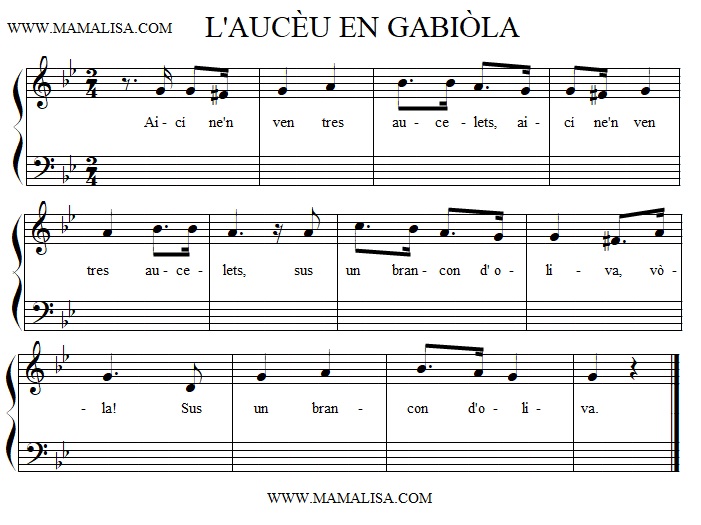L'aucèu en gabiòla
This song is in Provençal dialect.
Each line is sung twice.
L'aucèu en gabiòla
The Caged Bird
Folk Song
Folk Song
(Occitan)
(English)
Aicí ne'n ven tres aucelets
Sus un brancon d'oliva, vòla*.
N'i a dos que cantan lo plaser
E l'autre lei saluda, vòla.
Aqueu que lei saluda tots
Lo fau portar a ma mia, vòla.
Ah! Tenètz, mia, un aucelet
Metètz-lo en gabiòla, vòla
Fasètz-l'i lo restar sèt ans
Sensa manjar ni beure, vòla .
Quand lei sèt ans ne'n son passats
Lo rossinhòu s'envòla, vòla.
La dama li corre a l'après
Coma una frema fòla, vòla.
Arrèsta, arrèsta, rossinhòu,
Retòrna en gabiòla, vòla
Te farai manjar de pan blanc
Te darai de mon beure, vòla.
N'en vòle ges de ton pan blanc
E ni mai de ton beure, vòla.
Ieu manjarai d'erba de camp
De la pas caucigada, vòla
Ieu beurai d'aiga dau rocàs
De la pas trebolada, vòla
Ieu cantarai a mon plaser
Coma mei camaradas, vòla
Ame mai estre aucèu de camp,
Qu'un aucèu de gabiòla, vòla.
Here come three little birds
On a little olive tree branch, fly*!
There are two singing of pleasure
And the other one greets them, fly!
The one that greets them all,
I bring it to my sweetheart, fly!
Ah, here you go, sweetheart, a little bird,
Put it in a cage, fly!
Have it stay there for seven years,
Without food or drink, fly!
When the seven years are over,
The nightingale flies away, fly!
The lady runs after it,
Like a crazy woman, fly!
Stop, stop, nightingale,
Go back to your cage, fly!
I'll give you white bread to eat,
I'll give you some of my drink, fly!
I don't want any of your white bread
Nor your drink, fly!
I'll eat the grass in the fields
That nobody tramples on, fly!
I'll drink water from the rocks
That no one disturbs, fly!
I'll sing at my leisure,
Like my friends, fly!
I prefer to be a bird in the field
Than a bird in a cage, fly!
Notes
*"Vola" was the Provençal falconers' cry when they let their falcons loose.


Thanks!
Thanks and Acknowledgements
This song was collected by Damase Arbaud in Chants populaires de la Provence, t.1, Makaire éditeur-imprimeur, Aix-en Provence, in 1802.
Translated by Monique Palomares and Lisa Yannucci.


























